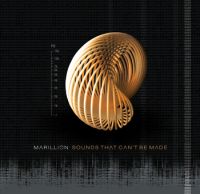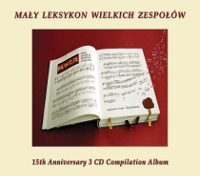 Well, we’ve heard it all before. I mean, the pre-release fret goes alike for any band. The new LP is announced and immediately tons of megabytes of a fervent volley of opinions start to flood the dedicated forums. The fans are afraid lest their expectations might be deceived. And they get split in that a staunch part resists any changes in sound and vision of the band, whilst the other, no less staunch, expects nothing less than a breakthrough to come with the new album. I, for one, support Steven Wilson’s squeamish stance, which, in a nutshell, is both of us simply don’t dig bands like AC/DC, which keep recording the same album all the time, decade in, decade out. I believe, if you keep stomping the same ground, musically, you just die, musically. Therefore, my expectations of Marillion’s new record set a very high plank for the seasoned Brits. On the other hand, I’m realistic enough to admit their very approach (light, easy-listen art-neo-prog or something like that), their very special sound can’t, shouldn’t, no, mustn’t be altered a hundred percent. For Marillion IS about the beauty of the melody, such one that enchants, squeezes tears out and shows stars. No giant leaps in the vein of Porcupine Tree changing over from the 60s’ psychedelic stuff to singer-songwriter to metal influences. Nonetheless, I would have wanted “Sounds That Can’t Be Made” to prove the legendary band’s ability to stun with some rather profound variations of their trademark musical philosophy. And I mean, a musical philosophy.
Well, we’ve heard it all before. I mean, the pre-release fret goes alike for any band. The new LP is announced and immediately tons of megabytes of a fervent volley of opinions start to flood the dedicated forums. The fans are afraid lest their expectations might be deceived. And they get split in that a staunch part resists any changes in sound and vision of the band, whilst the other, no less staunch, expects nothing less than a breakthrough to come with the new album. I, for one, support Steven Wilson’s squeamish stance, which, in a nutshell, is both of us simply don’t dig bands like AC/DC, which keep recording the same album all the time, decade in, decade out. I believe, if you keep stomping the same ground, musically, you just die, musically. Therefore, my expectations of Marillion’s new record set a very high plank for the seasoned Brits. On the other hand, I’m realistic enough to admit their very approach (light, easy-listen art-neo-prog or something like that), their very special sound can’t, shouldn’t, no, mustn’t be altered a hundred percent. For Marillion IS about the beauty of the melody, such one that enchants, squeezes tears out and shows stars. No giant leaps in the vein of Porcupine Tree changing over from the 60s’ psychedelic stuff to singer-songwriter to metal influences. Nonetheless, I would have wanted “Sounds That Can’t Be Made” to prove the legendary band’s ability to stun with some rather profound variations of their trademark musical philosophy. And I mean, a musical philosophy.
And this they did. I’ll make no bones about the first impressions – like some of the fellow fans, Gaza seemed too long, as did the whole album. It took me several spins at least to begin to appreciate what should have been obvious apriori: That Marillion can’t underdeliver and be amateurish. At 17:30 Gaza appears overly long. You just fail to grasp the track as one whole – but, after all, you will if you get on the same wavelength with the political issue of the song. To the uninitiated first-time listener, the song seems too stilted and too lofty. After all, no song has yet saved the repressed from oppression. But if to dig deeper, Gaza is a rare piece of a musical manifesto in that it is just too lengthy and too “prog”, structurally, for a straightforward mainstream Wind of Change type of thing. The realization of this has grown on me. Someday, surely, I’m gonna love it. Now, so much for Gaza.
To the title track now. 7:16, much shorter than the previous track and thus (at least, such is my impression), way more coherent. I can’t help praising Mark Kelly’s precise and succinct keyboards, weaving in and out, like thread on a loom, always there, but once thick and once thinner. Just as justifiably terse and always to the point, creating the ideal type of rhythmical layer for this semi-epic of sort. Rothery comes in with his trademark solo to create and to mark the culmination. Yummy. But nothing’s new under the sun of Marillion, again. I love the underlying groove. I love H’s passionate (as always!) vocals and the overall atmosphere of the song, it’s slow yet steady undulation.
Pour My Love. The protagonist is a tender lover and a realistic man, for all I know.
Love has died
But love is gonna live again.
At an age of more than twenty years every one of us earthlings will realize that
It makes no odds how we behave
We'll never work out how to live in peace
In this world, with this world
A song of pondering over harsh reality and all-permeating longing for the better. The power of this track reveals itself (or so it did to me) after more than one spin. More than one.
Power. The song, which was premiered before the LP’s release and more than coped with its mouth-watering mission. It trail blazed what I perceive as this album’s most distinct feature: a combination of slowed-down tempos and very mature (as in: wise) lyrics. My reading of it is: it’s about our hidden powers.
Montreal is really a travel song and a place song. Masterfully composed and performed, it meanders dreamily through various moods and mood swings of a traveler, who is easy to recognize as H himself, wondering at many things and even touching upon Skype’s ability to connect us across distances. I began to dig it only a good deal after the first exposure, but I think this fact only shows this track (and the other songs on the album) as truly progressive, in the better sense of the word. Just rummage in your memory: how many listens did you require to fully appreciate King Crimson’s “Red” album or, more recently, Steven Wilson’s “Insurgentes”? And I mean sensing all the subtleties and impeccability of the recording as a whole, putting the whole musical puzzle together. Same is true of this record and this enchanting musical reverie of Canada’s more prominent spot. And yet again, lyrically this effort is as mighty as it is musically. I find myself sauntering down a Montreal street doing fashion shopping, skyping someone home from Circque de Soleil and being welcomed by a smiling Eskimo girl, even though I’ve never seen the city.
Invisible Ink.
What do you use invisible ink for? To only write to the only one who should only be able to peruse what’s in the message. And, as earlier, she, when she “breathes on them”, will find him telling her to let go of fear.
The fear will go
And everything will flow
The song is about fear as much as it is about love:
Love and fear
Which do you have for me
A powerful metaphor of a lyric, connecting ink to fear and hope, a weighty argument for problems between him and her, sung with H’s trademark shrilling voice, at moments faltering into a desperate falsetto, makes for a song a lot of people will subconsciously connect with. Ah, and it’s also about the power of the written word, isn’t it?
Lucky Man. How much do we really need in this life and why do we, why should we “pine for” these earthly delights if he is a lucky man without all of these? Some superb, disquieting guitar work from master Rothery, but with a band with the cohesiveness of Marillion’s none of the players lags behind or fails to deliver. Marillion play here and on all the tracks like a truly five-headed musical mastermind.
The closing piece, Sky Above the Rain is a personal favourite, indeed, I’ll go as far as to declare it Marillion’s most attractive “broken love” ballad. The potent repetition of the title line ultimately compels the listener to imagine a frail yet unrelenting ray of sunlight, fighting its way through the thunderhead of a failed relationship. I perceive this song lyric-wise as much as musically, for the words of mutual accusation and fragile hoping mean so much here.
I’m drawing the line here, I’m pulling my headphones tight and I’m going for another listen. Of the yet so many to come.






